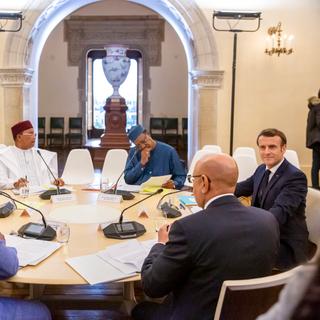


Macron's Africa policy: The story of a disillusionment
Long Read'France-Africa, the breakdown' (3/3). Despite his lauded ambition to renew relations between the ex-colonial power and its former sphere of influence, the French president has failed to truly overhaul relations with the continent.
On November 28, 2017, the atmosphere was feverish in the central auditorium of the Ouaga 1 Professeur Ki-Zerbo University in Ouagadougou, Burkina Faso, built with Libyan funds back in the time of Muammar Gaddafi. "France no longer has an Africa policy," asserted Emmanuel Macron to the applause of the students, whom he was trying to win over to his side. "Like you, I am from a generation that has never known Africa as a colonized continent. I am from a generation for whom one of the fondest political memories is Nelson Mandela's victory. I am from a generation of French people for whom the crimes of colonization are indisputable[...] I am from a generation where we don't come and tell Africa what to do," he proclaimed, without acknowledging how much differentiates him from his audience, apart from his age. The speech was intended to be seminal. It set out to renew the relationship between the former colonial power and the part of the African continent it had colonized.
The conference was also marked by a memorable incident. When questioned on the issue of frequent power cuts in Burkina Faso, the French president called on his Burkinabe then-counterpart, Roch Marc Christian Kaboré, who was present at his side, to respond. "But I don't want to be in charge of electricity in Burkina Faso's universities! That's the president's job," he said. At the same time, Kaboré slipped away – as we would later learn – to satisfy a pressing need. "And so, he's leaving... Stay!" the French president called out to him, in a casual, somewhat mocking tone that many would consider paternalistic. He then concluded: "He's gone to fix the air conditioning."
This anecdote was still fresh in people's memories six years later, when some 1,500 French troops deployed in Niger were forced to withdraw in early October, following the July 26 military coup. It represented a major setback for the French president. "The quip had more impact than anything he said during his visit," recalled a diplomat. "Because of his age, Emmanuel Macron could have been very popular in Africa, but it's not the case, because his direct style, suggesting that his counterparts get a grip on themselves rather than complain, has trouble going down well."
As for the Ouagadougou speech, it has shown its own limitations. Nothing, not even the proactivity then displayed, has seemed able to stem the decline in French influence in French-speaking Africa. This has been exacerbated since military putschists from Mali (2020), Burkina Faso (2022) and then Niger (2023), have made challenging the relationship with Paris into their primary political lifeblood, with a degree of popular success.
You have 90% of this article left to read. The rest is for subscribers only.
